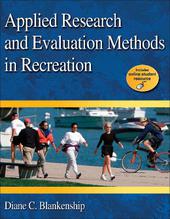
|
Applied Research and Evaluation Methods in Recreation
Hardback
Main Details
| Title |
Applied Research and Evaluation Methods in Recreation
|
| Authors and Contributors |
By (author) Diane C. Blankenship
|
| Physical Properties |
| Format:Hardback | | Pages:200 | | Dimensions(mm): Height 279,Width 216 |
|
| Category/Genre | Sports and outdoor recreation |
|---|
| ISBN/Barcode |
9780736077194
|
| Classifications | Dewey:790.072 |
|---|
| Audience | | Tertiary Education (US: College) | |
|---|
| Illustrations |
25 Halftones, black and white; 12 Illustrations, black and white
|
|
Publishing Details |
| Publisher |
Human Kinetics Publishers
|
| Imprint |
Human Kinetics
|
| Publication Date |
2 December 2009 |
| Publication Country |
United States
|
Description
The importance of research and evaluation in the park and recreation industry is becoming increasingly evident as agencies are being asked to justify their existence to a variety of stakeholders. By properly evaluating programs, recreation professionals can better understand the impact of their programs and, with data in hand, justify future investments. Applied Research and Evaluation Methods in Recreation helps students build the competencies they need in order to meet professional standards. Applied Research and Evaluation Methods in Recreation is the only text that integrates research, evaluation, and basic statistical analysis and links these concepts directly to the recreation field. Using a logical format and accessible language, the book provides students with the foundational knowledge they need in order to move through the research process. They'll explore the various types of research commonly used in the field (including qualitative, quantitative, and action research) and then learn about the steps involved in designing a project, from developing the research problem, reviewing literature, and identifying variables and hypotheses to defining the population to study, developing the instrumentation plan, and choosing the appropriate data-collection tools. Then they'll move on to evaluation concepts, including internal validity, data analysis, and reporting methods. The author's approach to the material makes this textbook truly unique. Each chapter builds on the previous one to clearly explain the steps of the research process and show how all of the concepts are interrelated. Students will learn not only why the steps and concepts are important but also how they relate specifically to the field. Each chapter closes with features that help students apply what they've learned: a case study, exercises, and For the Investigator, an ongoing research project that uses a hypothetical recreation survey to give students realistic practice in recreation research. The text contains many other features that will help students better understand and apply the concepts they've learned. Chapter-opening scenarios offer examples of the kinds of research that students might be expected to undertake. Objectives highlight the key points of each chapter, and a glossary offers easy access to definitions of unfamiliar terms. Professional Perspectives sidebars describe real research projects from current professionals with an explanation of the project's importance to the organization. Applied Research and Evaluation Methods in Recreation also includes an online student resource (OSR) that provides additional opportunities for students to apply the information they've learned. Students will analyze two scholarly articles-one qualitative and one quantitative-throughout the course based on the concepts learned in each chapter. The OSR also contains a case study for each chapter that can be used in assessing students' comprehension of the concepts covered or as the basis of in-class discussion and exercises to help students better understand and apply the material. In addition, the For the Investigator project appears in the OSR so students can easily download documents and data related to it. Through the practical approach of Applied Research and Evaluation Methods in Recreation, students will gain the foundational knowledge they need in order to become confident in using their research and evaluation skills to meet the demands of their profession.
Author Biography
Diane C. Blankenship, EdD, is an associate professor at Frostburg State University in Frostburg, Maryland, where she teaches courses in research methods in the recreation and parks management program. She also serves on the program's graduate thesis and project committee. Blankenship has extensive and varied experience, having worked as a professional Boy Scout and a recreation therapist; in residential camps, aquatic facilities, recreation centers, and outdoor recreation facilities; and for the Department of the Army in Germany. Blankenship has used her skills in recreation and leisure research methods to assist local and state organizations in the evaluation of their programs and facilities and in strategic planning. She is a member of the Maryland Recreation and Parks Association (MRPA) and has served numerous times on the conference committee and as the coordinator of data analysis for all conference evaluations. In addition, she serves as a site visitor for the Commission for Accreditation of Park and Recreation Agencies (CAPRA) and as a recreation commissioner for the City of Frostburg. In her free time, Blankenship enjoys walking rail-trails, knitting, and traveling with her daughter to Native American reservations. She and her husband, Calvin, and their daughter reside in Frostburg.
|